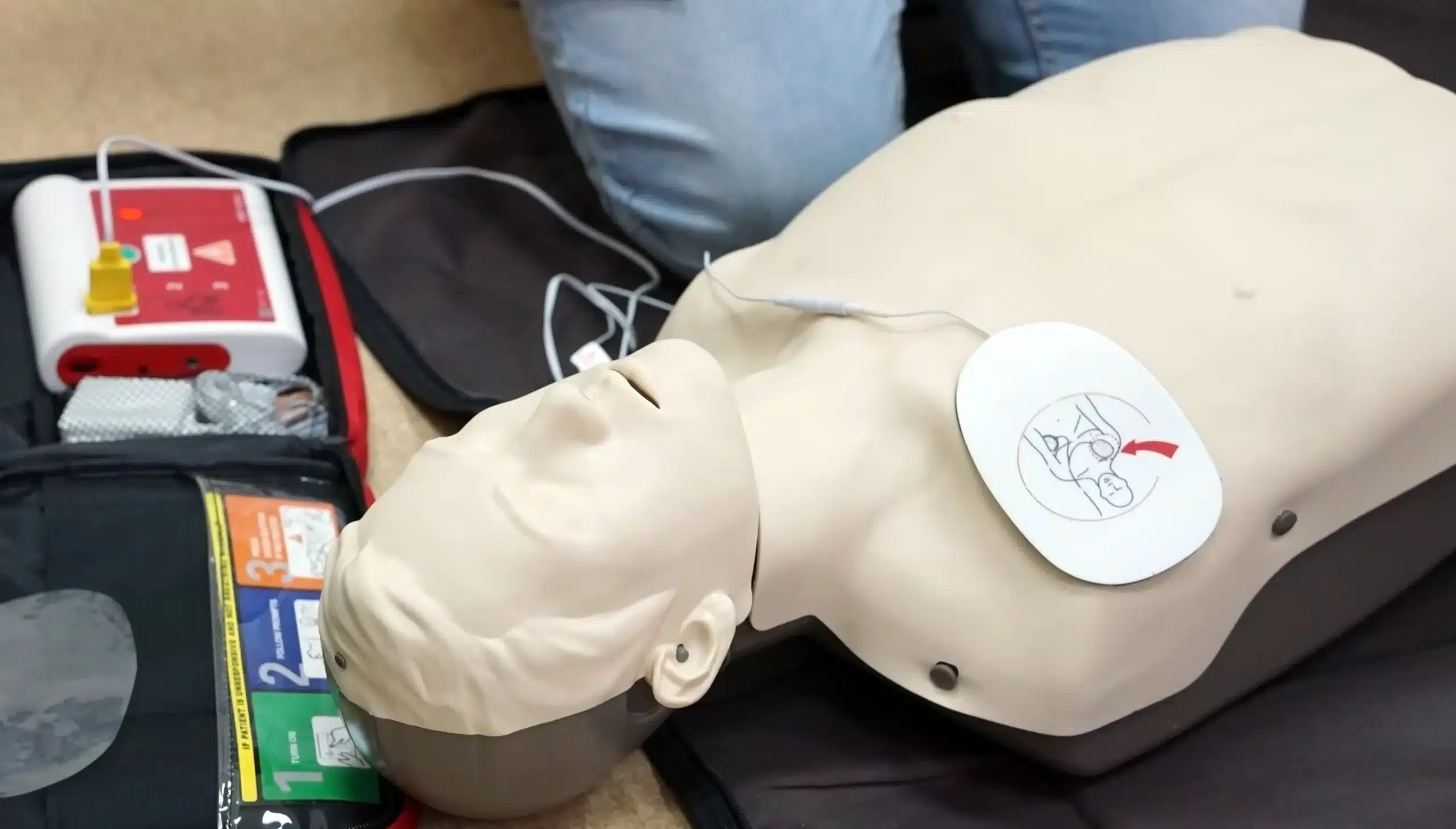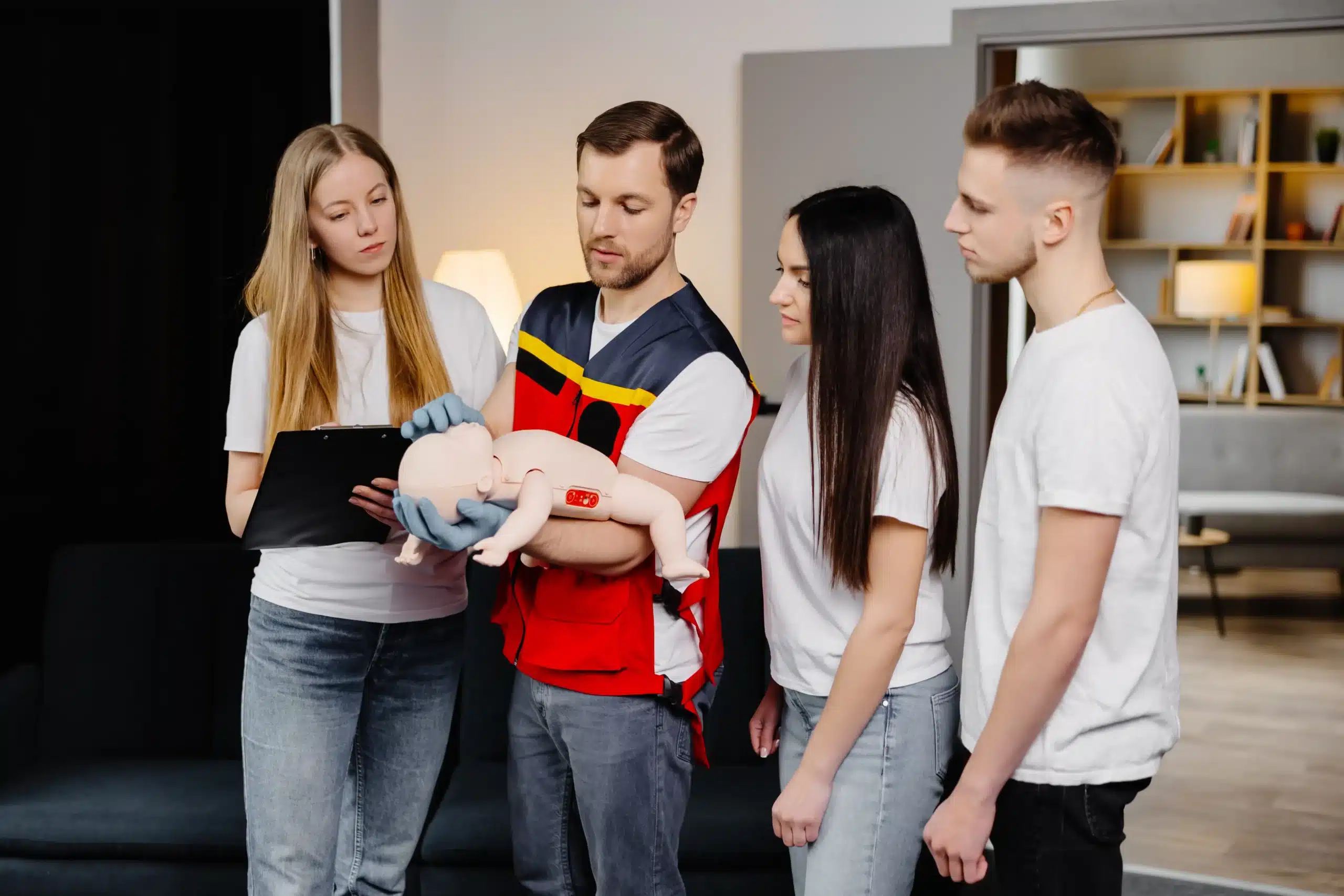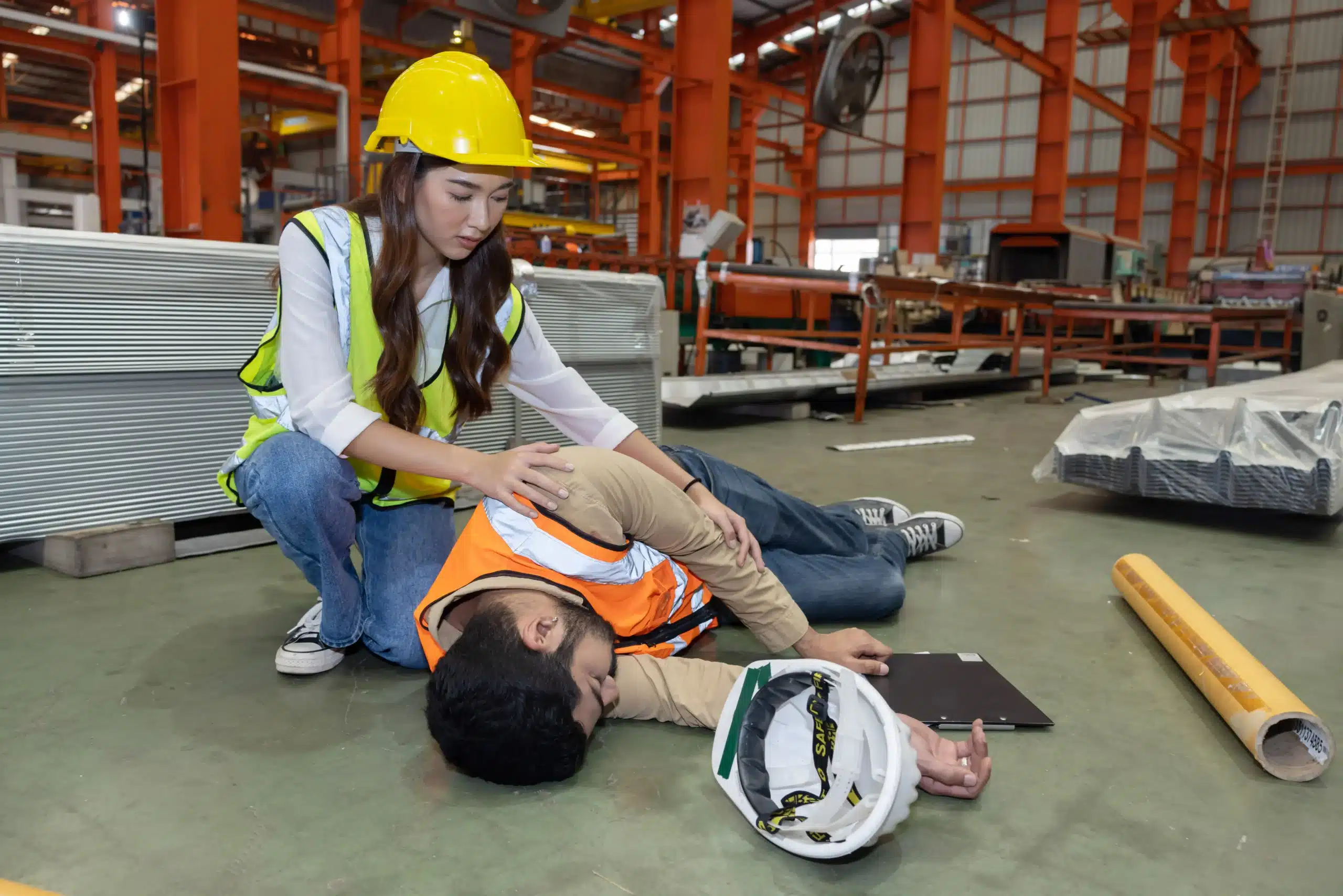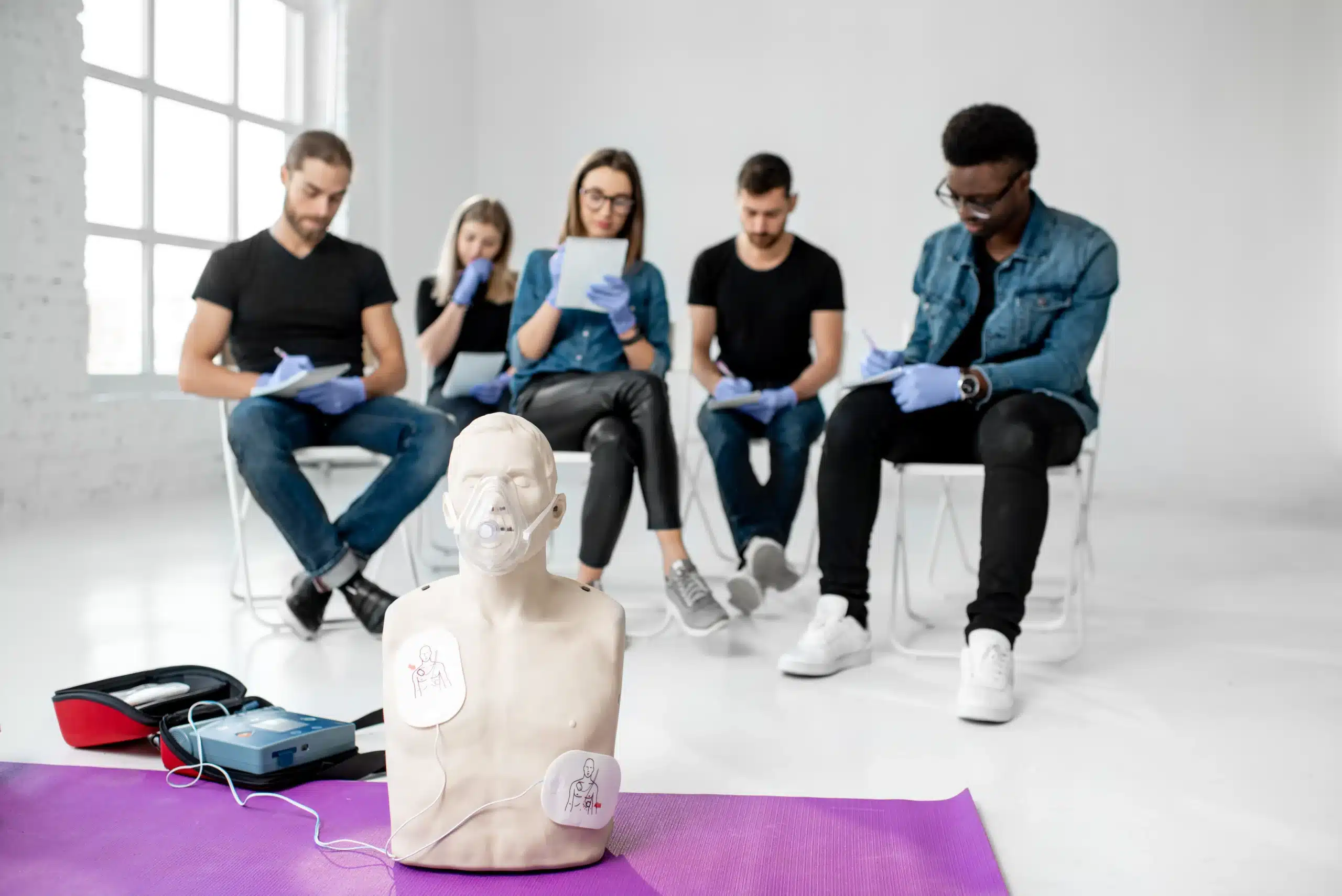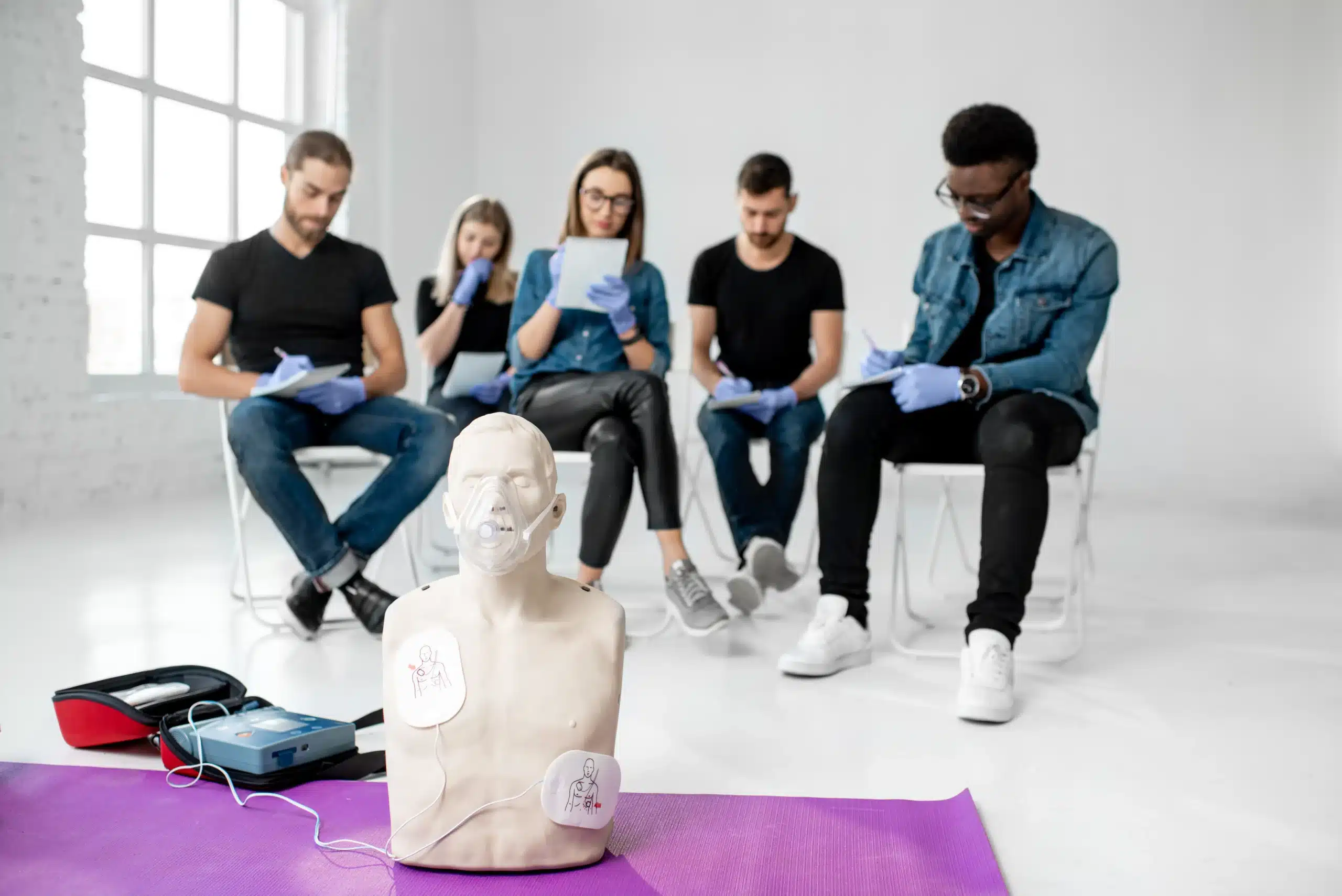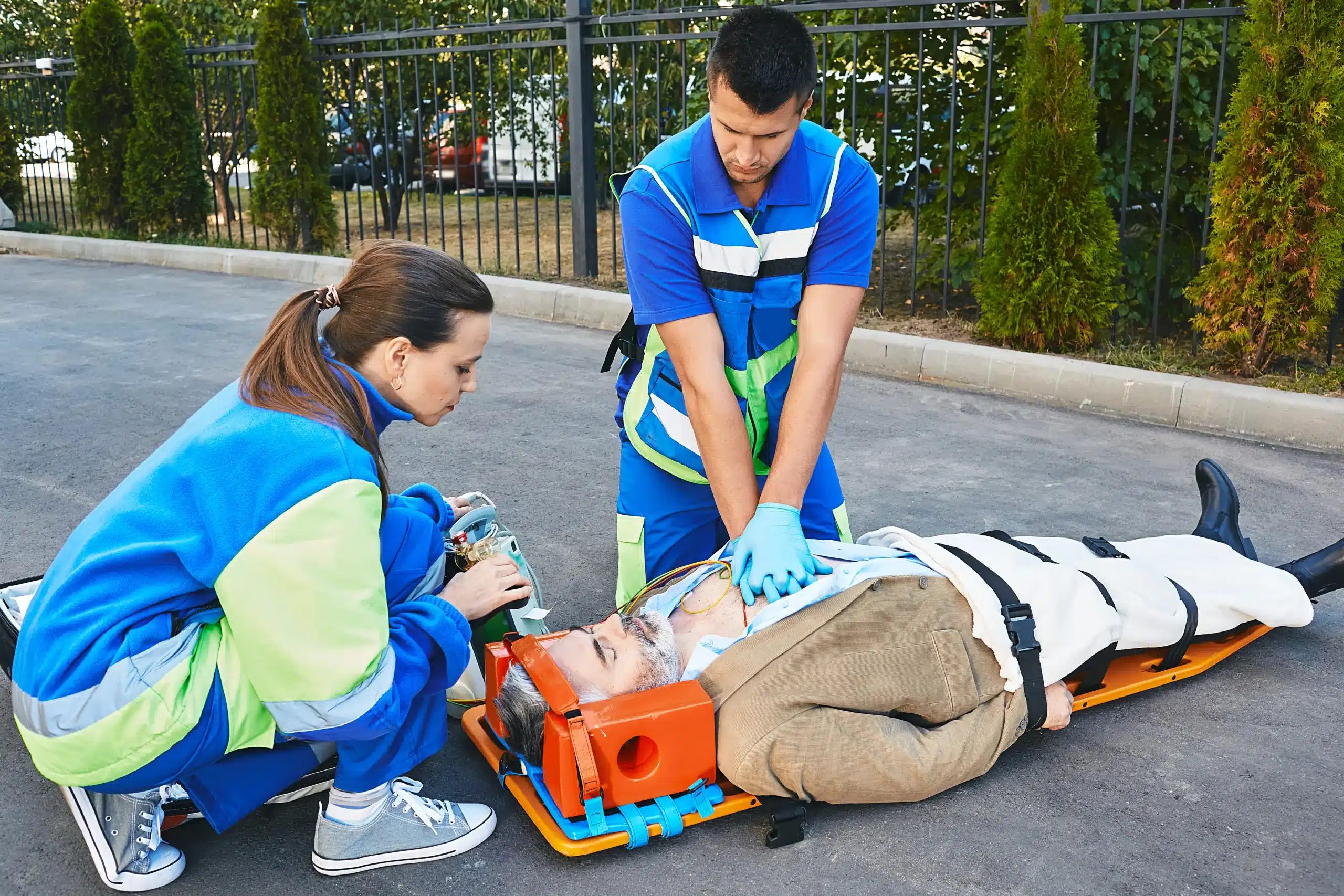Life is unpredictable, and emergencies can happen anytime, anywhere. Being equipped with CPR skills can empower you to act decisively and potentially save a life. This guide serves as your roadmap to CPR training, covering everything from basic life support to advanced certifications. We’ll help you understand the different types of CPR courses in Woodland, the benefits of ongoing training, and how to choose the right course for your needs. We’ll also address common misconceptions and provide valuable resources to help you on your journey to becoming CPR certified.
Key Takeaways
- Find the right CPR training for you: Whether you’re a parent, teacher, healthcare professional, or simply want to be prepared, explore CPR and first-aid training options ranging from basic to advanced certifications like ACLS and PALS.
- Davis CPR Classes offers accessible, high-quality training: Serving Davis, Woodland, and Sacramento, they provide AHA-certified courses, flexible scheduling, a low price guarantee, and the RQI program for convenient recertification.
- Maintain your CPR skills for long-term preparedness: Regularly renew your certification and consider continuing education to stay up-to-date with the latest guidelines and techniques, ensuring you can always respond effectively in emergencies.
What is CPR? Your Woodland Guide
Cardiopulmonary Resuscitation (CPR) is a life-saving technique used when someone’s heart stops beating. It combines chest compressions and rescue breaths to maintain blood flow and oxygen to the brain and vital organs. CPR buys crucial time until professional medical help arrives, acting as a bridge between cardiac arrest and the arrival of paramedics. CPR Educators, Inc. explains how CPR keeps oxygen flowing and the heart beating until emergency responders arrive.
Knowing CPR empowers you to act decisively in real-life emergencies, offering a chance of survival in a critical situation. Online Safety Trainer underscores the importance of CPR certification and its vital role in bridging this critical gap. CPR training equips you with the skills to potentially save a life, offering support until medical professionals take over. CPR Guardians provides real-world examples of when knowing CPR can make all the difference.
This training not only teaches the necessary skills but also builds confidence to respond effectively in emergencies. CPR Tacoma highlights how CPR training empowers individuals and provides the confidence to act when needed. Various CPR training programs, from basic to advanced, teach how to perform compressions and rescue breaths effectively. CPR Classes explores different types of CPR training scenarios to prepare individuals for various situations. These courses provide the knowledge and practice necessary to respond confidently and correctly.
CPR Training: What are Your Options?
Choosing the right CPR course can feel overwhelming with so many options. This section breaks down the different types of CPR training available, from basic to advanced, so you can find the best fit.
Basic CPR and First Aid
CPR and first-aid certification equip you to respond to emergencies and potentially save lives. These courses cover essential life-saving techniques, including chest compressions, rescue breaths, and how to manage common injuries like cuts and burns. This foundational training is valuable for anyone, regardless of profession. It empowers you to assist family, friends, or even strangers during critical moments.
Basic Life Support (BLS)
BLS certification goes a step further than basic CPR. While it includes CPR techniques, it also covers more in-depth procedures like using a bag-valve mask and working effectively as part of a team during a medical emergency. These skills are especially important for healthcare providers and those working in healthcare settings. BLS certification is often a job requirement for many healthcare positions. Davis CPR Classes offers American Heart Association BLS courses in Davis, conveniently serving Woodland and Sacramento.
Advanced Cardiovascular Life Support (ACLS)
ACLS is a comprehensive course primarily designed for healthcare professionals, such as doctors, nurses, and paramedics. It builds upon the skills learned in BLS, adding advanced techniques for managing respiratory and cardiovascular emergencies. ACLS training covers topics like airway management, electrocardiogram (ECG) interpretation, and pharmacology related to emergency care.
Pediatric Advanced Life Support (PALS)
PALS training focuses specifically on the emergency care of infants and children. This specialized training is essential for healthcare providers working in pediatrics, emergency medicine, or intensive care units. PALS certification teaches participants how to recognize and respond to life-threatening situations in young patients, covering areas like pediatric assessment, resuscitation, and medication administration.
Find CPR Courses in Woodland
Finding the right CPR class in Woodland doesn’t have to be a challenge. With several excellent training centers available, you can find a course that fits your schedule and learning style. Let’s explore some of your options.
Training Centers and Locations
Woodland offers various locations for CPR training. For comprehensive CPR, First Aid, and BLS certification, check out In Home CPR, which has served Woodland since 2010 and offers flexible scheduling. They provide classes seven days a week, including evenings, making it easier to fit training into your busy schedule. Another option is Safety Training Seminars, offering American Heart Association (AHA) courses like BLS, ACLS, and PALS throughout the week. This accessibility ensures you can find a class time that works for you.
Davis CPR Classes: Your Choice for Woodland & Beyond
While several options exist within Woodland, consider expanding your search to nearby cities. Davis CPR Classes offers a range of AHA-certified courses, including BLS, ACLS, and PALS, serving Davis, Woodland, and Sacramento. They are known for their low price guarantee and provide high-quality instruction. They use advanced mannequins for realistic practice scenarios, giving you the hands-on experience you need to feel confident in an emergency. If you’re a medical professional, Davis CPR Classes also offers the convenient RQI program for certification renewal. This blended learning approach combines online coursework with in-person skills sessions, allowing you to learn at your own pace.
Qualified Instructors & Top-Notch Training
At Davis CPR Classes, we’re committed to providing high-quality CPR instruction that empowers you to confidently respond to emergencies. Our training combines expert instructors, advanced technology, and practical exercises to ensure you gain the skills and knowledge you need.
AHA-Certified Instructors
Our instructors hold certifications from the American Heart Association, a nationally recognized leader in CPR training and certification. This ensures your certification will be widely accepted and reflects the highest standards of CPR education. You’ll learn the latest techniques and guidelines, preparing you to handle real-world emergencies.
Practice on Advanced Mannequins
Hands-on practice is crucial for mastering CPR. Our courses use advanced mannequins that provide real-time feedback on your compressions and breaths. This allows you to refine your technique and develop muscle memory. Studies show that practicing with feedback-enabled mannequins increases student engagement and leads to better CPR performance. This interactive approach builds the confidence and precision needed to deliver effective CPR.
Real-Time Feedback
In addition to mannequin practice, our instructors provide personalized, real-time feedback throughout the course. This immediate guidance helps you correct errors and reinforce proper techniques. For healthcare professionals, we offer the Resuscitation Quality Improvement (RQI) program, a blended learning approach that uses advanced technology and personalized feedback to optimize CPR competency. Research supports the effectiveness of RQI training for developing and maintaining CPR skills, especially for nurses and other healthcare providers. This focus on continuous improvement ensures you’re always ready to provide the best possible care.
Costs, Discounts, and Registration
Knowing the cost and how to register for a CPR class helps you plan ahead. This section breaks down pricing, discounts, and registration options for CPR courses in Woodland.
Course Pricing
Our combined CPR and First Aid certification course is priced affordably at $140. This covers the online portion of the CPR and First Aid training, the in-person skills session, and your official certification card. Other courses, like BLS, ACLS, and PALS, have varying prices, so check the specific BLS course page for up-to-date information.
Discounts & Our Low Price Guarantee
We’re committed to providing accessible safety training and offer a low price guarantee. We believe that cost shouldn’t prevent anyone from learning these essential skills. We regularly compare our prices to other providers in Sacramento County to ensure we offer competitive rates. If you find a lower advertised price for an equivalent course and certification, we’ll match it. See our Low Price Guarantee page for details.
Register Online or In-Person
We offer daily classes in Woodland and surrounding areas. Registering is easy. Use our online registration system to find a convenient class time and enroll quickly. If you prefer, you can also register in person at our training center. We also offer on-site training, bringing the instruction directly to businesses and organizations in Woodland.
Choose the Right CPR Course
Knowing which CPR class is right for you can feel overwhelming with so many options. Don’t worry, we’ll break it down to help you make the best choice. Whether you’re looking for personal enrichment or professional development, understanding your needs is the first step.
Assess Your Needs
CPR and first-aid certification are crucial for effectively responding to emergencies. Ask yourself why you want to learn CPR. Are you a parent wanting to be prepared for anything? Are you changing careers and need a certification? Or maybe you want to volunteer and need specific training. Clearly defining your goals will guide you to the right course. For example, a basic CPR and first-aid class might be perfect for a parent or teacher, while healthcare providers often require more advanced training like BLS. Consider also where you might need to use these skills. Are you looking for skills to use at home, in the workplace, or in the community?
Align Courses with Career Goals
Your career aspirations play a significant role in choosing the right CPR course. If you’re pursuing a career in healthcare, AHA BLS CPR classes are often a must-have. These courses provide the foundational knowledge and skills required in many healthcare settings. Other professions, like childcare providers or lifeguards, may also require specific certifications. Researching industry standards and certification requirements will ensure you select a course that aligns with your professional goals. Even if your job doesn’t require certification, having these skills can make you a more valuable employee and give you a competitive edge. Check with your employer or professional organization for guidance on recommended certifications.
Flexible Scheduling
We all lead busy lives, and finding time for training can be challenging. Luckily, many CPR training providers offer flexible scheduling options to fit your lifestyle. Look for classes offered on weekends, evenings, or even online. Some providers, like Davis CPR Classes, offer classes in multiple locations and formats to accommodate various schedules. This flexibility allows you to prioritize your training without disrupting your other commitments. Consider factors like your work schedule, family obligations, and commute time when exploring available class times and locations. Don’t let a busy schedule stop you from gaining these valuable, potentially life-saving skills.
Keep Your CPR Certification Current
CPR is a critical skill for responding to emergencies, but like any skill, it can fade over time. Staying current with the latest guidelines and techniques ensures you can provide effective assistance when needed. Regularly renewing your certification and pursuing continuing education are key to maintaining your CPR proficiency.
Renew Your Certification
CPR certifications, such as those from the Red Cross, are typically valid for two years. While even imperfect CPR is better than no CPR during a cardiac arrest, refreshing your knowledge and skills through recertification is essential. This process ensures you’re prepared to administer CPR confidently and correctly. Check with your certifying organization for specific renewal requirements. For BLS recertification in the Davis area, browse upcoming BLS courses on our website.
Continuing Education
Continuing education is vital for maintaining and expanding your CPR knowledge. Staying informed about advancements in resuscitation techniques and guidelines can significantly improve the effectiveness of your care. Consider pursuing advanced training, such as ACLS and PALS, to build upon your foundation and develop specialized CPR skills. Research consistently demonstrates that ongoing training, especially with programs like RQI, strengthens CPR competency, which is crucial for patient safety.
RQI Blended Learning
Davis CPR Classes offers the convenient RQI (Resuscitation Quality Improvement) program for BLS, ACLS, and PALS certifications. This blended learning format combines online modules with in-person skills testing using voice-activated mannequins. RQI’s flexible structure allows you to learn at your own pace and receive immediate feedback, resulting in increased proficiency and confidence. You’ll receive your certification card the same day you complete the skills evaluation.
Benefits of CPR Training
Knowing CPR can make a real difference in critical situations. It’s not just about the technical skills; it’s about the confidence and knowledge you gain to respond effectively. Let’s explore some key advantages of CPR training:
Confident Emergency Response
CPR training empowers you to take action in emergencies. Instead of feeling helpless, you’ll have the skills and confidence to step in and provide immediate assistance, potentially keeping someone stable until professional help arrives. This preparedness can make all the difference in a critical situation.
Enhanced Emergency Knowledge
CPR classes, especially those including first-aid certification, broaden your understanding of emergency response. You’ll learn to assess situations, make quick decisions, and provide appropriate care. This expanded knowledge base equips you to handle a wider range of emergencies with greater composure and skill.
Career Advancement
CPR certification is a valuable asset for your resume. It demonstrates your commitment to safety and preparedness, which can give you a competitive edge in many fields. CPR training is particularly relevant for roles in healthcare, education, and childcare, signaling to potential employers that you’re ready to handle critical situations.
CPR Training Myths Debunked
Let’s clear up some common misconceptions about CPR training. These myths can prevent people from learning a skill that can save lives.
“CPR is Only for Healthcare Professionals”
It’s easy to think CPR is just for doctors and nurses, but that’s not true. Anyone can learn CPR—parents, teachers, coaches, and anyone else who wants to be prepared for an emergency. In fact, bystander CPR can significantly improve survival rates before professional help arrives. CPR Educators, Inc. emphasizes that anyone can get CPR certified, empowering individuals from all walks of life to learn this life-saving skill. At Davis CPR Classes, we offer a variety of CPR courses designed for everyone.
“CPR Training is Too Difficult”
Worried that CPR training is too complex? It’s more straightforward than you might think. Our classes at Davis CPR Classes are designed to be accessible and empowering. We focus on building confidence so you’ll know what to do in a real emergency. The American Heart Association has found that participants feel prepared and confident in their abilities after completing their training.
“No Refreshers Needed After Initial Training”
CPR skills and knowledge can fade over time, so staying up-to-date is crucial. Like many certifications, both CPR and BLS certifications are valid for two years and require recertification. Regular refreshers help you maintain those skills and ensure you’re ready to respond effectively. Davis CPR Classes offers convenient RQI blended learning for refresher courses. You can also learn more about the difference between BLS and CPR certification from the Red Cross.
CPR Training Providers in Woodland
Finding the right CPR training provider is crucial for a positive and effective learning experience. Here are a few options to consider in and around Woodland:
Safety Training Seminars
Safety Training Seminars, a woman-owned American Heart Association Training Center, offers a variety of high-quality AHA courses. These include BLS, ACLS, PALS, CPR, and First Aid. They offer courses throughout the week in Woodland and surrounding areas, providing flexibility for those seeking training. Visit the Safety Training Seminars website for more information on their schedule and course offerings.
Kiser CPR, LLC
Kiser CPR, LLC is an AHA-authorized provider offering certification courses in CPR, First Aid, and BLS. They provide both in-person and on-site classes, serving various locations, including Woodland, Davis, Winters, Sacramento, and Vacaville. Visit the Kiser CPR website for more details.
American Red Cross
The American Red Cross Gold Country Region offers various CPR and first aid training courses at multiple locations. Their website provides class schedules, locations, and contact information.
Davis CPR Classes
Davis CPR Classes offers a comprehensive selection of CPR and first-aid training in Davis, conveniently serving the nearby communities of Woodland and Sacramento. As an AHA Training Center, they offer a range of courses, including BLS, ACLS, and PALS. They also offer the RQI program, an innovative approach for medical professionals to maintain their certifications. View their course schedule to register for upcoming classes. For budget-conscious individuals, Davis CPR Classes offers a low price guarantee. They also provide specialized training, such as EMSA Health, Safety, and Lead Poisoning certification.
Related Articles
- CPR Classes in Sacramento: A Complete Guide – Davis CPR Classes
- BLS Classes in Sacramento: The Complete Guide – Davis CPR Classes
- CPR Certification in Davis: Your Complete Guide – Davis CPR Classes
- Debunking Common CPR Myths for an Effective Response
- Essential Role of CPR in Healthcare: A Lifesaving Skill
Frequently Asked Questions
What’s the difference between BLS and CPR?
CPR is a core component of BLS, but BLS goes further. Think of BLS as CPR plus other essential skills for healthcare providers. BLS includes using equipment like bag-valve masks and working as a team during medical emergencies. It’s a more comprehensive approach to life support.
How do I choose the right CPR class for me?
Think about why you want to learn CPR and where you’ll use these skills. If you’re a parent, teacher, or just want to be prepared, a basic CPR and first-aid class might be perfect. Healthcare providers usually need BLS or more advanced training like ACLS or PALS. Consider your career goals and required certifications too.
How much does CPR training cost?
Costs vary depending on the course and provider. Basic CPR and first-aid courses are generally more affordable than advanced certifications like BLS, ACLS, or PALS. Check with specific training centers like Davis CPR Classes for their pricing and any available discounts. They even offer a low price guarantee!
How often do I need to renew my CPR certification?
Most CPR certifications are valid for two years. Staying current is important, so make sure you recertify before your current certification expires. Regular refreshers help you maintain those skills and ensure you’re ready to respond effectively in an emergency.
What if I have a busy schedule? How can I fit in CPR training?
Many training centers understand busy schedules and offer flexible class times, including evenings and weekends. Some even offer online components or blended learning options like the RQI program, allowing you to learn at your own pace and complete in-person skills sessions when it’s convenient.


